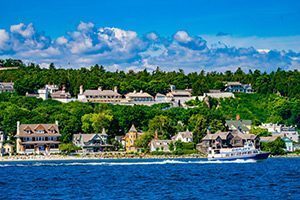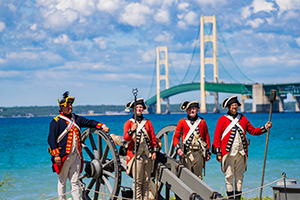Drill was a regular feature of daily life for the soldiers of the 23rd Infantry posted at Fort Mackinac in the 1880s. Like American soldiers across the country, they spent several hours every week at drill, target practice, and other exercises to hone their skills. However, the small American army of the 1880s was widely dispersed at isolated posts, meaning that soldiers rarely had the opportunity to practice large-scale maneuvers or tactics. To provide the soldiers with a taste of regular campaigning, through the 1880s the 23rd Regiment partnered with the Michigan State Troops (a forerunner to the Michigan National Guard) to host summer training camps. In 1888, the Michigan State Troops elected to hold the annual encampment on Mackinac Island.

Since over 1,000 men belonged to the brigade of the Michigan State Troops, they visited Mackinac in two waves. The 2nd and 4th Regiments came to the island July 12-16, while the 1st and 3rd Regiments arrived on July 19 and departed on July 24. Additionally, Colonel Henry Black, commanding officer of the 23rd Infantry, brought two more companies of regulars and the regimental band from Fort Wayne in Detroit. Alongside the men of Companies E and K stationed at Fort Mackinac, these professional soldiers of the 23rd were expected to teach the part-time troops of the Michigan State forces by example. All of the visiting soldiers set up camp on the government pasture, now the Grand Hotel golf course, and named their small tent city Camp Luce after Governor Cyrus Luce.
For the most part the camp went smoothly, with the amateur and professional soldiers working alongside one another. The troops participated in a variety of large-scale drills, culminating in a sham battle staged for Governor Luce and Governor Richard Oglesby of Illinois on July 23. However, numerous reports from the Cheboygan Democrat newspaper, and some of the officers of the 23rd and the Michigan State Troops, make it clear that some of the men may have had a bit too much fun at Mackinac. On July 12 the Democrat shared the story of an MST soldier who, after drinking downtown, went back to camp
“but did not have the countersign, and was afraid of the guards. Finally a bright idea struck him. He went back downtown and secured two bottles of beer, and one under each arm proceeded back to camp. Soon he was halted by a sentry, and the following conversation ensued: ‘Halt! Who comes there?’ ‘A friend with two bottles of beer.’ ‘Advance, friend, and deliver up one bottle.’ The truant did so and passed into camp.”

The summer nights were apparently quite cold for the men sleeping in tents in the pasture. On July 19, the Democrat reported that as the sentries called out “Two o’clock and all is well” one man “in a sober strong, foghorn voice,” yelled back “Two o’clock and colder than hell!” In the same issue, the Cheboygan reporter noted that Mackinac’s saloons were doing brisk business, with one taking in $218 in a single day. “Pandemonium reigned in the village and respectable ladies had to keep off the streets.” Later the same week the paper reported that a gang of soldiers boarded the yacht Julia in the harbor and “stole two marine glasses valued at $75, and even went so far as to climb the mast to steal the brass ball off the top mast head.” The same soldiers apparently “stole everything they could lay their hands on in the stores and elsewhere.” On July 26, the Democrat proudly related that at least some of the mischievous MST men met their match earlier in the week and “had a genuine experience in war in about one-hundredth of a second after they insulted a Cheboygander’s better half Monday. One had both eyes blacked, and the other had his bread basket kicked in, and the rest took to their heels.”
Reflecting on the island camp, Colonel E.W. Irish of the 2nd Regiment of the MST advocated against returning to Mackinac. Given the hijinks reported by the Cheboygan Democrat, Irish’s assertion that “I fear the many attractions of the isle of ‘Fairy Legends’ necessarily interfere somewhat with the devotion to duty which ought to be expected of soldiers” seems to be a bit of an understatement. According to another Democrat report from July 12, the “dude soldiers with new uniforms and a pocketful of cash” from the state troops also caused friction with the regulars of the 23rd Regiment.
In any case, the 1888 summer encampment was the first and last time the Michigan State Troops ventured to Mackinac. In 1889 they stayed in southern Michigan, going into camp at Gognac Lake, near Battle Creek (previous summer encampments were held at Island Lake near Brighton). The men of Companies E and K traveled south from Mackinac for the summer training period, this time joined by the entire 23rd Regiment. If you would like to learn more about the soldiers of the 23rd Infantry and the summer drills held on Mackinac Island, plan a visit to Fort Mackinac. Please also consider joining or making a donation to Mackinac Associates, who fund projects throughout Mackinac State Historic Parks’ museums.









